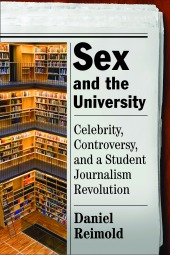In what amounts to a hugely positive shake-up in student press circles, Palestra.net has purchased UWIRE, the richest content provider in collegemediatopia, the Center for Innovation in College Media announced earlier today.
—
Billing itself as “an online home for everything college students care about,” Palestra.net “has been operating outside the traditional college media sphere” since its launch in 2006, according to CICM director Bryan Murley.
—
With the UWIRE purchase, however, it is official: Palestra is now on the inside.
—
Joe Weasel, Palestra.net Co-founder and CEO, is a former Ohio State University journalism professor and Scripps Howard News Service syndicated columnist with years of broadcast reporting experience. (Second on the “Bios” list.) He graciously spoke to me just now about the transaction, which he said has been in the works since Thanksgiving ’08:
—
What is the goal for Palestra in picking up UWIRE?
We’re trying to position the company, which is now UWIRE, that’s what we’ll go by is UWIRE, we’re trying to find an outlet and find the mechanism whereby students can get even more engaged in not only print and text but digital journalism. We’re trying to get students as much exposure as possible to the outlets that combine both UWIRE and Palestra and in essence keep building the college network. UWIRE is a good fit for Palestra because it’s such a foundation for journalism students. Even though we’re changing platforms and technology changes and consumption changes, we still pretty much believe the foundation is still going to be a solid writer. That’s not going to change. This kind of brings that into play for us.
—
What changes will student editors or the sites’ visitors notice?
You are going to see the UWIRE site maybe improved a little bit. For the most part, the mechanics of how UWIRE works will remain. You know, Ben French did a tremendous job of setting that company up and getting it into the position of where it is and it would be foolish to change that. The differences you’ll see, we’re going to launch a number of education intitiatives in the fall of ’09. We’re going to try to increase our presence with some of the college organizations and try to become as much of a partner as possible with schools. We also have some plans that hopefully will help drive traffic to the student newspaper sites because UWIRE isn’t UWIRE without a strong newspaper network. So we have to continue to build upon that, like I said, the things that Ben laid the foundation for.
—
This must be a personally exciting time for you, as Palestra Co-founder.
While it’s a very scary time for journalism, I’m hoping that this is the time to kind of bring all the different media together and find out where some of the dust settles. I really want to see students get opportunities. As a professor, it was always frustrating that it seemed like the students I had, the best ones, were schlepping around delivering pizzas so they could stay in school. That was really why I started Palestra, to try to find paid internships, not to compete or not to replace TV stations or school papers but to try to find a branch to get them into the profession the best I could and I think this helps enhance it even more.
—
Any teasers on the education initiatives you mentioned?
We have the UWIRE 100, which is a phenomenal place to start to see where some of the best [j-students] are that will come out into the workplace. We want to take that model and do some specific initiatives that get students exposed and to get them direct links into a number of media, using both text and video to be able to have access to networks and get exposure they maybe normally wouldn’t have.
Read Full Post »






